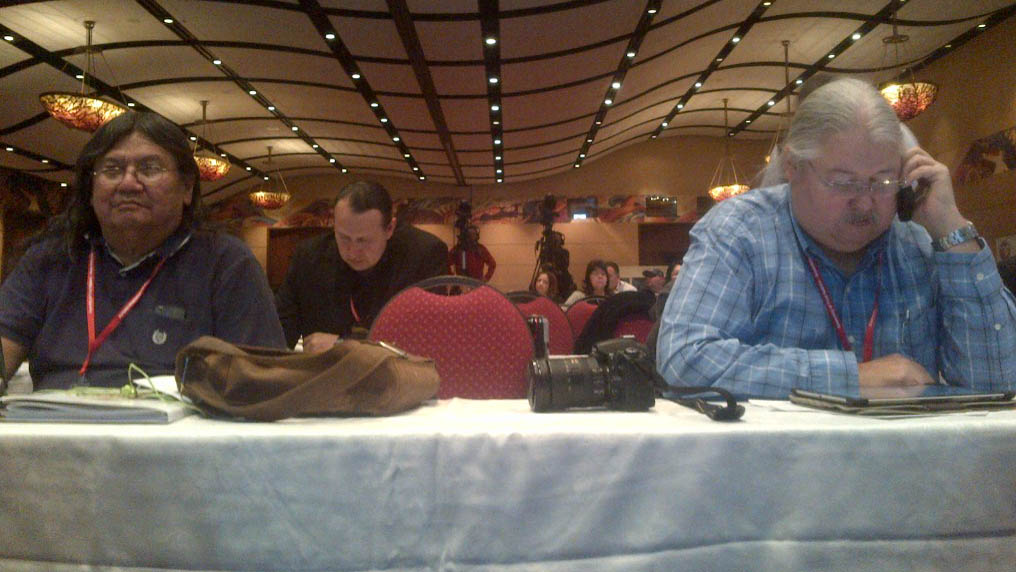Aboriginal Affairs DM made “snide remark” about Idle No More’s silence: BC Chief
A senior British Columbia chief says the deputy minister of Aboriginal Affairs made a “snide remark” about the lack of Idle No More protests during a recent meeting in Ottawa of a committee created during a controversial meeting between Prime Minister Stephen Harper and First Nation chiefs last Jan. 11.
(Aboriginal Affairs deputy minister Michael Wernick. Photo Carleton University website)
APTN National News
GATINEAU, Que.–A senior British Columbia chief says the deputy minister of Aboriginal Affairs made a “snide remark” about the lack of Idle No More protests during a recent meeting in Ottawa of a committee created after a controversial meeting between Prime Minister Stephen Harper and First Nation chiefs last Jan. 11.
Grand Chief Stewart Phillip, president of the Union of British Columbia Indian Chiefs, said Aboriginal Affairs deputy minister Michael Wernick made the remark during a Dec. 6 meeting of the senior oversight committee on comprehensive claims.
“One of the most senior federal officials made a very snide remark,” said Phillip. “(Wernick) said something to the effect that there is not as much noise outside this time.”
APTN National News contacted Aboriginal Affairs Minister Bernard Valcourt’s office seeking comment, but has of yet not received a response.
Phillip said the remark shows Ottawa won’t make any changes until they are directly challenged on the streets through demonstrations.
“The only time they are compelled to act is when we have that noise outside,” said Phillip. “We need to actually manifest ourselves as nations.”
Phillip’s statements came during a debate at the Assembly of First Nations special chiefs meeting in a Gatineau, Que., casino around the senior oversight committee on comprehensive claims, also known as modern day treaties.
Chiefs were warned that Ottawa’s modern-day treaty process was a “trap” aimed at “extinguishing” their rights.
(Arthur Manuel, left, proxy for Neskonlith Indian Band, and Russ Diabo, right, proxy for Wold Lake First Nation. APTN/Photo)
First Nations negotiating modern-day treaties will become beggars in their own lands, said a representative from a British Columbia First Nation sent to speak on behalf of his community’s chief at the Assembly of First Nations winter gathering.
Arthur Manuel, who is a proxy for the Neskonlith Indian Band in B.C., said his community won’t negotiate with Ottawa until “extinguishment” is taken off the table.
“We know that is their real goal and objective because it has to do with our land,” said Manuel.
Manuel said reserve lands make up just 0.2 per cent of all land in Canada.
“What does (Prime Minister Stephen) Harper represent? He represents 99.8 per cent. Who is going to be rich and who is going to be poor? The guy who gets 0.2 is going to be poor,” said Manuel. “You need to deal with land before you deal with self government because you’ll be a beggar in your own land.”
Manuel was responding to a presentation by AFN B.C. regional chief Jody Wilson-Raybould on the progress of the senior oversight committee which includes senior federal officials and First Nation representatives. Wilson-Raybould spoke about the need to transform federal policy on the issue.
Manuel said the committee would do little to change the current aim of things.
“If you are going to change the policy all you are saying is talking about Harper’s political decision. That is what policies are, it is a political decision, it has nothing to do with the law,” said Manuel. “You need to talk about what kind of political weight, political impetus to change the prime minister’s mind and I do not believe SOC (the senior oversight committee) is strong enough…scrap the SOC, get rid of it because it’s not going to meet the needs of Indigenous people in this country.”
Russ Diabo, a proxy for Wolf Lake First Nation in Quebec, said Ottawa wants “extinguishment” and was pushing for it at 93 negotiating tables with individual First Nation communities while the AFN was trying to convince the federal government to change its policies.
“Meanwhile we are sitting here talking about reconciliation,” said Diabo. “What you are doing is exchanging pre-existing rights for new rights and they are diminished rights and it is to become Canadian within the Canadian federation…Are we falling into a trap here?”
Diabo made similar comments during a preliminary session Monday and Wilson-Raybould addressed it directly during her presentation and referred to Nelson Mandela in her response.
“Somebody said they do not support reconciliation or don’t need reconciliation and to me this was an interesting comment to make. It is a bit of a dangerous comment or a sad comment,” she said. “We have to come together to be building or our nations or builders of a broader country that we have to live in.”
A separate senior oversight committee was also created from the Jan. 11 meeting to discuss treaties and it’s also facing resistance from some chiefs.
“I am afraid for my children, I am afraid if we continue down this pass with this SOC process, if we continue to give it more legitimacy than we already have, I fear we are in trouble,” said Serpent River First Nation Chief Isadore Day, from Ontario.
Day, responding to a presentation on the treaty SOC by AFN Saskatchewan regional chief Perry Bellegarde, said the AFN had no mandate from chiefs to enter into the SOC talks.
“If you give proof to me that this SOC has been formally endorsed and we have given mandate of full force to proceed, until then, there is no mandate for SOC,” said Day, to clapping in the audience.
Bellegarde, who is believed to be angling for a run to replace Atleo in 2015, said he welcomed the comments.
“That’s what this is all about, dialogue,” he said. “You see the diversity across this land in terms of treaties.”
But it was an AFN youth delegate from Onion Lake First Nation who triggered the loudest applause after he took the microphone, which is reserved for chiefs or their proxies.
“I hear people talk about sovereignty, talk about rights, all these things, but do they understand them,” said Clayton Tootoosis, who is from Treaty 6. “We were born with these rights, given to us from the Creator.”
Tootoosis, who was given the right to speak at the microphone by one of the chiefs in the assembly, said it bothered him that chiefs talked about treaties and money in the same breath.
“We are here talking within this casino, talking about money, talking about treaty,” said Tootoosis. “But it seems we have forgotten who we are, I know exactly who I am, I come to this earth. Let us remember who we are and where we come from…We are not about money, that is not our way.”












Why is it that it’s always a white man sitting in the seat of Aboriginal Affairs deputy minister?
Deputy Minister… or deputy DAWG? What a POS. They want more IdleNoMore ? We’ll BRING IT! grrrrrrrr…
Who titled this article? No one gives a crap about “snide remarks”.
The real issue in the article is about extinguishment of our rights for SOC reconciliation deals.
How canJody Wilson-Raybouldn be a chief and hold a position within a organization that loans money to FN reserves and for payment they collect the taxes on reserve.
Clayton Tootoosis you are one great visionary and FN need more men like you leading.
Clayton Tootoosis you are one incredible man.